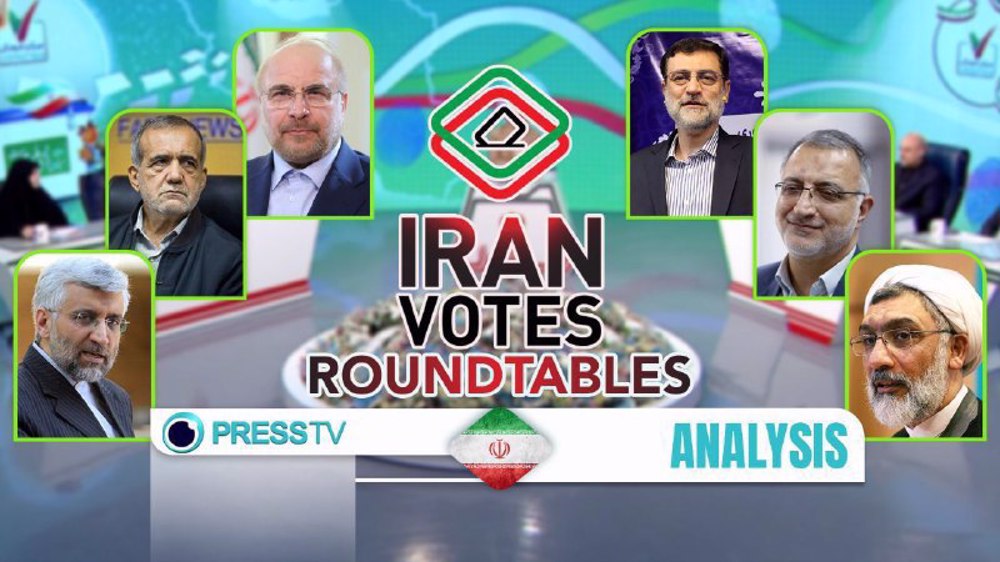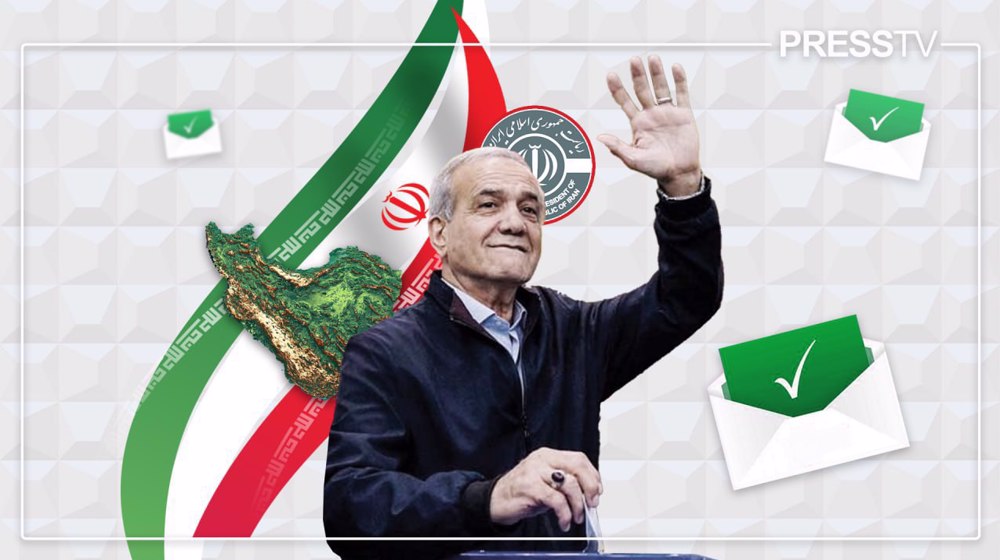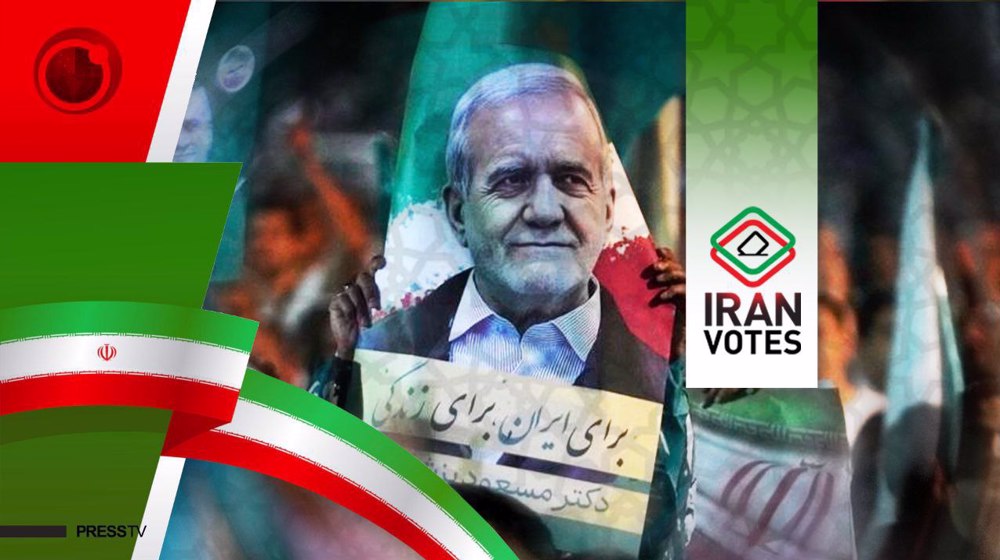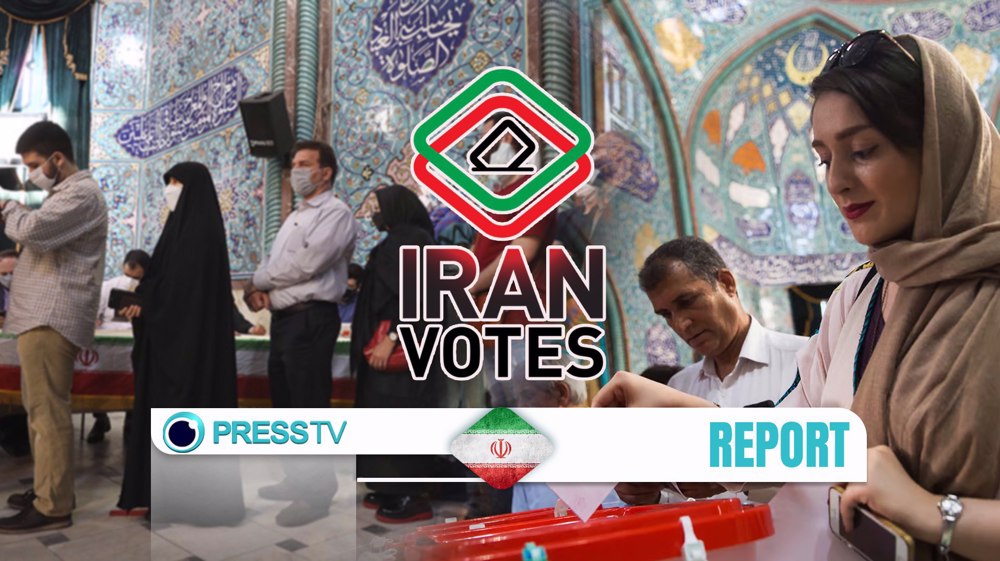Iran Election 2024: What transpired on first day of televised roundtables
By Alireza Akbari
Campaigning for the June 28 snap presidential election in Iran is gaining momentum, with hopefuls busy impressing voters with their plans and programs through televised shows and field events.
On Thursday, three presidential candidates appeared on the Islamic Republic of Iran Broadcasting (IRIB) for roundtable discussions, presenting their vision for the country in different areas.
These candidates include Mostafa Pourmohammadi, Baqer Qalibaf, and Masoud Pezeshkian.
The roundtables are scheduled to continue with these and the other three candidates on different subjects – politics, economics, and culture – until the presidential debates commence on Monday.
These six contenders for the presidency of the Islamic Republic, endorsed by the country’s 12-member election supervisory body, have been expounding on their plans and visions during roundtable discussions and other programsbroadcast on state TV in recent days.
The first candidate to participate in the televised roundtable on Thursday was Pourmohammadi, who previously held positions as the Minister of Interior Affairs (2005-2008) and the Justice Minister (2013-2017) of the Islamic Republic of Iran in different administrations.
Pourmohammadi primarily focused on topics relating to the country’s economy, foreign policy, relations with neighboring countries, and regional alliances.
He underscored the importance of advancing the economic interests of the Islamic Republic, asserting that the country must prioritize stability, security, and economic prosperity.
He expressed his commitment to fostering a thriving community characterized by enhanced material well-being and the pursuit of eternal happiness.
Pourmohammadi stressed the necessity of engaging with the global community to actualize this vision, emphasizing the pivotal role of foreign policy in facilitating essential communication and transactions.
He also highlighted Iran’s significant influence as an important player in the region, noting the country's resilience in the face of adversities such as Western sanctions and the imposed war.
He referred to the diverse array of Iran’s neighboring states, each possessing unique cultures, geographic locations and economic resources, which he deemed as “valuable markets capable of meeting Iran's needs.”
The candidate commended the strides made during the tenure of the late President Ebrahim Raiesi in “cultivating international alliances,” particularly citing the impact of BRICS and the Shanghai Cooperation Organization (SCO) in advancing Iran's national interests.
The BRICS group of nations is an alliance between emerging economies initially formed in 2006 by Russia, China, India, and Brazil, and joined four years later by South Africa. Iran announced its membership in the bloc on January 1, 2024.
The Shanghai Cooperation Organization (SCO), headquartered in China, is the world's largest regional organization in terms of area and population.
It consists of nine member states: Iran, China, Russia, India, Pakistan, Kazakhstan, Uzbekistan, Kyrgyzstan, and Tajikistan. In July 2023, the SCO officially approved Iran's full membership.
Furthermore, Pourmohammadidescribed the Palestinian cause as “emblematic of the Islamic Republic's diplomatic endeavors,” stressing the nation's enduring commitment to championing “freedom and autonomy in the region.”
He affirmed the importance of aligning foreign policy objectives with the preservation and promotion of Iran's civilization and Islamic heritage, expressing a willingness to engage in negotiations and international relations when they align with national interests.
The next candidate to participate in the televised roundtable discussion was Qalibaf, the speaker of the Iranian parliament and senior lawmaker, who primarily discussed cultural issues during his segment.
Qalibaf underscored the significance of culture as a cornerstone of any society, emphasizing that advancements and progress should encompass both cultural and social spheres.
He highlighted the interconnectedness between progress and cultural matters, noting the reciprocal impact between the two domains.
During his presentation, Qalibaf referenced the emphasis placed by the Leader of the Islamic Revolution Ayatollah Seyyed Ali Khamenei on economic issues, particularly in choosing the slogan of the year.
He pointed out that economic concerns have a substantial influence on cultural affairs, signaling the inseparable link between them.
The former Tehran Mayor also emphasized the pivotal role of women and family within the cultural landscape, deeming them paramount topics in the arena of culture.
He also touched upon the significance of education and training, emphasizing the crucial role of “effective management and stability” in fostering educational attainment.
Qalibaf highlighted the importance of press freedom, characterizing the press as the “voice of public opinion.”
Additionally, he mentioned the pivotal window of opportunity within the seven-year demographic golden period, expressing his ambition to empower the youth of the nation to propagate a culture of resistance through innovative mediums such as computer games.
According to Qalibaf, investment should be directed towards scientific research and exploration to bolster the realm of knowledge acquisition.
Masoud Pezeshkian, a former minister of health and a veteran lawmaker, was the third candidate to participate in the roundtable discussion on Thursday, primarily focusing on economic issues.
Pezeshkian, while critiquing the economic fault lines, delineated his economic priorities for the country.
Drawing inspiration from a letter by Imam Ali ibn Abi Talib (AS), the first Shia Imam, to his companion Malik al-Ashtar, in which the Imam categorized society into distinct sections, Pezeshkian highlighted the significance of traders and business owners as the “stable pillars” of society.
Pezeshkian attributed the failure to achieve previous development plan objectives to a lack of adherence to requirements, emphasizing the necessity of “utilizing experts.”
He advocated for a multifaceted approach involving internal experts, foreign advisors, collective wisdom, and scientific solutions to attain specific goals and ideals.
To realize these objectives, Pezeshkian stressed the importance of adjusting regulations in alignment with goals and fostering “stress-free foreign relations.”
He referenced directives from the Leader of the Islamic Revolution advocating for “joint investments with countries not in conflict with the Islamic Republic.”
Furthermore, Pezeshkian highlighted the potential of the “digital economy” to provide avenues for growth amidst imposed sanctions.
The former lawmaker also emphasized the significance of “diplomatic language and tension reduction,” in accordance with the country's general policies.
Trump admin. asks transportation body to share passenger names in expanded deportation push: Report
UN sounds alarm over record Palestinian displacement, surge in illegal settler attacks in West Bank
Iran emerges as global fertility hub, blending innovation, research and scientific excellence
VIDEO | Can Europe save Ukraine?
VIDEO | EU freezes Russian assets
Iran’s PMI slips 0.8 points to 49.8 in November: ICCIMA
Two US soldiers, interpreter killed in surprise attack in Syria: CENTCOM
VIDEO | Epstein in Africa










 This makes it easy to access the Press TV website
This makes it easy to access the Press TV website